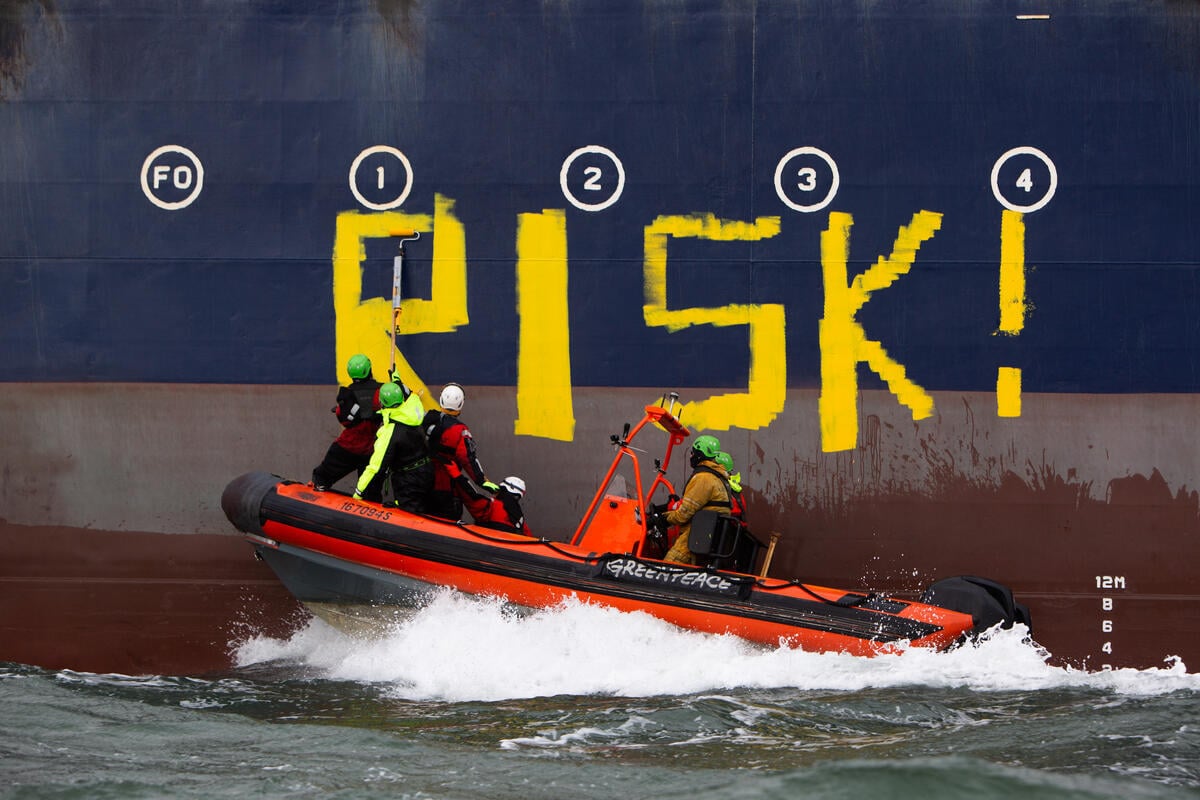Tokyo, Japan – Greenpeace Japan strongly condemns the decision of the of Prime Minister Suga’s cabinet to dispose of over 1.23 million tons of radioactive waste water stored in tanks at the Fukushima Daiichi Nuclear Power Plant into the Pacific Ocean.[1] This completely disregards the human rights and interests of the people in Fukushima, wider Japan and the Asia-Pacific region.
The decision means that Tokyo Electric Power Company (TEPCO) can begin radioactive waste discharges from its nuclear plant into the Pacific Ocean. It has been said it would take 2 years to prepare for the discharge.
Kazue Suzuki, Climate/Energy Campaigner at Greenpeace Japan, said:
“The Japanese government has once again failed the people of Fukushima. The government has taken the wholly unjustified decision to deliberately contaminate the Pacific Ocean with radioactive wastes. It has discounted the radiation risks and turned its back on the clear evidence that sufficient storage capacity is available on the nuclear site as well as in surrounding districts.[2] Rather than using the best available technology to minimize radiation hazards by storing and processing the water over the long term, they have opted for the cheapest option [3], dumping the water into the Pacific Ocean.
The Cabinet’s decision failed to protect the environment and neglected the large-scale opposition and concerns of the local Fukushima residents, as well as the neighboring citizens around Japan. Greenpeace stands with the people of Fukushima, including fishing communities, in their efforts to stop these plans,” said Suzuki.
Greenpeace Japan’s polling has shown that the majority of residents in Fukushima and the wider Japan are opposed to discharging this radioactive waste water into the Pacific. Additionally, the nationwide federation of Japan Fisheries Cooperatives has continued to express its complete opposition to ocean discharges.
United Nations’ human rights special rapporteurs warned the Japanese government in June 2020 and again in March 2021 that discharging the water into the environment breaches the rights of Japanese citizens and its neighbors including Korea. They called on the Japanese government to delay any decision on discharging the contaminated water into the sea until the crisis of COVID-19 is over and appropriate international consultations are held[4].
Though the decision has been announced, it will take around two years before these discharges commence at the Fukushima Daiichi plant.
Jennifer Morgan, Executive Director at Greenpeace International, said:
“In the 21st century, when the planet and in particular the world’s oceans are facing so many challenges and threats, it is an outrage that the Japanese government and TEPCO think they can justify the deliberate dumping of nuclear waste into the Pacific Ocean. The decision is a violation of Japan’s legal obligations under the United Nations Convention on the Law of the Sea[5], (UNCLOS), and will be strongly resisted over the coming months.”
Since 2012, Greenpeace has proactively campaigned against plans to discharge Fukushima contaminated water – submitting technical analysis to UN agencies, holding seminars with local residents of Fukushima with other NGOs, and petitioning against the discharges and submitted to relevant Japanese government bodies.
Furthermore, a recent Greenpeace Japan report detailed alternatives to the current flawed decommissioning plans for Fukushima Daiichi, including options to stop the continued increase of contaminated water.[6] Greenpeace will continue to lead the campaign to stop radioactive waste water from being discharged into the Pacific.
ENDS
Notes:
[1] TEPCO, report on ALPS treated water
[2] Greenpeace report October 2020, Stemming the Tide
[3] METI, “Tritiated Water Task Force Report”, June 2016
[4]United Nations Human Rights Office of the High Commissioner June 2020 and March 2021
[5] Duncan Currie, Japan’s plan for radioactive water defies international law
[6] Satoshi Sato “Decommissioning of the Fukushima Daiichi Nuclear Power Station” March 2021
Contacts:
Shaun Burnie, Senior Nuclear Specialist, Greenpeace East Asia:
[email protected], +447904958286
Mitsuhisa Kawase, Communications Officer, Greenpeace Japan: [email protected], +81 (0)70-3195-4165
Greenpeace International Press Desk: [email protected], +31 (0) 20 718 2470 (available 24 hours)
For the latest Greenpeace International press releases, please follow us on twitter @greenpeacepress



